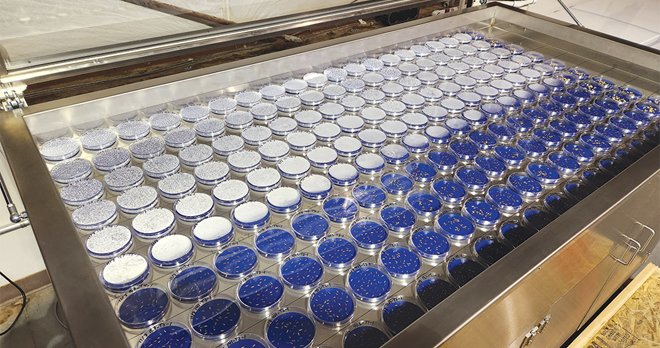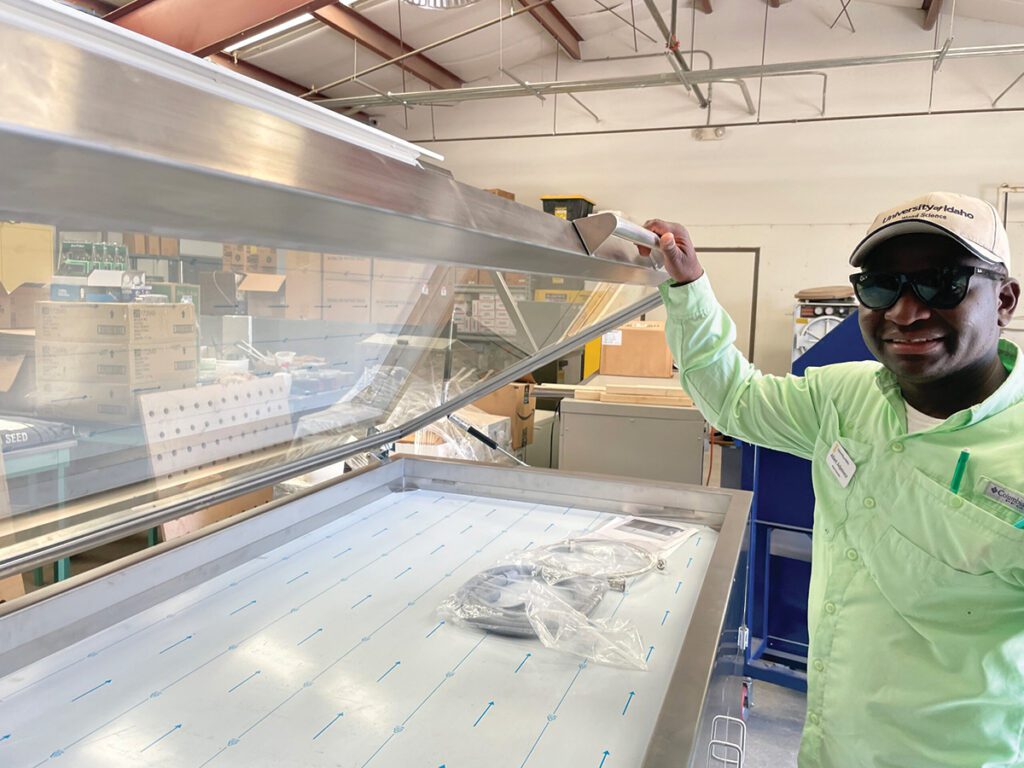

Mar 10, 2024Researcher study conditions triggering weed emergence
University of Idaho researchers are using newly acquired equipment to study when temperatures are ideal to kick off the growing cycle of different weeds.
The goal is to determine the best time to apply herbicides, and eventually tackle the growing problem of herbicide resistance.
The study at the University of Idaho (UI) Kimberly Research and Extension Center in Moscow, Idaho, uses a new thermogradient table, made possible by a grant of about $24,000 from the Pacific Northwest Herbicide Resistance Initiative.


The project began in October. Albert Adjesiwor, a UI Extension weed specialist, said the current project is focusing on Italian ryegrass, wild oat and cheatgrass, which are problematic grassy weeds in small grain production such as wheat, barley and oats, although they can be a problem for other crops.
However, the research model can be expanded and applied to other crops, including specialty crops, from potatoes to tree fruit.
“Once we are done with these first round of studies, we will expand this to other common and problematic weeds in our region,” Adjesiwor said. “It has a bit of application to other crops. Weeds like Italian ryegrass have been problematic in orchards, fruit and vegetable (production) in states like Oregon.”
The thermogradient table allows weeds to germinate under the same conditions but a range of temperatures, with the study focusing on extremes of 41-104 °F.
“The table has cooling and heating units, with conducting ‘lines’ running under a polished steel plate,” he said. “We set the lowest and highest temperature, and the table creates a temperature gradient from the front to the back of the table, between the low and high temperatures.”
Plant species have different germination temperature requirements, and sometimes the same species collected from different regions or crop situations vary in the conditions needed to germinate, Adjesiwor said.
Chandra Maki, Adjesiwor’s doctoral student, is leading the study for her weed science dissertation.
“We know there are substantial differences in temperature — heat accumulation, growing degree days — and moisture across the (Pacific Northwest)” she said in a UI news release. “We expect specific weeds from different conditions to behave a bit differently and this project would help us assess and map these differences.”
Herbicide resistance
Adjesiwor said addressing weed resistance to herbicides is not solved by applying more herbicides. It’s just a matter of time before nature will find a way to circumvent the chemicals’ process of attacking plants. By studying the conditions that trigger the germination of weed seeds, researchers are going “back to basics,” he said.
“This is because we find ourselves recommending more soil-applied herbicides to manage herbicide-resistant weeds,” he said. “When those soil-applied herbicides don’t work well, it’s often difficult to tell whether the weeds have started to emerge before the herbicide got activated.”
The table’s ability to heat soil and other growing media will allow Maki and other researchers to test if, and when, soil temperatures would render certain herbicides ineffective.
The germination temperature requirements studies are a small part of this initiative. Researchers are also evaluating germination moisture requirements to determine the least amount of moisture needed to activate soil-applied herbicides, among others.
As growers rely more on soil-applied (pre-emergence) pesticides to control grassy weeds like Italian ryegrass, knowledge is key to their effectiveness. Adjesiwor said weeds that germinate and thrive before the pre-emergence pesticides are applied won’t be killed, and the project’s results will help growers maximize weed control.
Researchers have collected weed seeds from throughout Idaho to grow on the thermogradient table to assess regional differences and how they affect emergence rates. They are on the second round of seed testing and Adjesiwor said Italian ryegrass data should be available by the end of the year.
Pacific Northwest Herbicide Resistance Initiative
Approved by Congress in 2022, the Pacific Northwest Herbicide Resistance Initiative (PNWHRI) involves USDA-Agricultural Research Service personnel in Pullman, Washington, and Pendleton, Oregon, and Extension/ university research at UI, Oregon State University and Washington State University. Adjesiwor said the initiative designs and implements research projects for integrated management of herbicide-resistant weeds in the Pacific Northwest.
Although the PNWHRI primarily targets weeds that are problems for cereal grains producers, the research is of value to grower of many crops, because many weeds are pests to multiple crops, including vegetables, fruits and other specialty crops in the Pacific Northwest and elsewhere.
“The (PNWHI) is a regional effort to address herbicide resistance,” he said. “We have come to terms with the fact that resistance management requires an individual as well as a community effort.”
— Chris Koger, managing editor
Top photo: Italian ryegrass seeds are monitored by University of Idaho researchers to see when they will germinate when subjected to different temperatures by using a thermogradient table. Photo by Chandra Maki.














